Creating a Most Loved Workplace
About one-third of a person’s life is spent at work. With that investment of time, people want to love what they do. They strivetofind meaning in their professional life, and often try to intertwine it with their personal goals and beliefs. They want to love WHAT they do: and as Human Resour-ce professionals, we can impact whether they love WHERE they do it, as well. In this new study byBest Practice Institute we have, identified what causes someone to love their organization, the impact love has on performance, and how YOU can create a MostLoved Workplace®.
A Most Loved Workplace® means highly motivated employees, ready to perform and spread the word about your company.
EXECUTIVE SUMMARY
A new study from Best Practice Institute led by founder Louis Carter has revealed some surprising results. In a global survey of over 150 employees from Fortune 1000 companies, we’ve shown that employees who love their workplace are up to 4 times more likely to perform at a higher level than those who do not. This reveal data shows getting respect drives a most loved workplace, which translates to performance and more.
Others focus on benefits, compensation, company perks, and even having friends at work, to create an organization where employees want to work. However, our study verifies something far different. A great equalizer when creating a desired workplace: R-E-S-P-E-C-T.For employers, whether you’re a F50 company or a small 300-employee organization, respect is the new currency, and one any organization can have an unlimited supply of if they choose.
The survey outlines exactly what causes employees to love their organization, and what employers can do to cultivate that love in their company. We show what extras have no impact on the most loved workplace. The data show where employees diverge between most loved, neutral, and disliked workplace, and how those differences impact the bottom line on a daily basis. In a single category, the results show 94% of employees report they are likely to perform better for a most loved company: 59% of those at 4 times as likely. The net result has the potential to transform all staff into high-performing employees that positively impact the bottom line.
Our data reveals
•What fosters the most loved workplace attitude
•Key returns of the most loved workplace attitude
•What works and what doesn’t
•The split between those who love their company and those who don’t
Introduction
Louis Carter’sBest Practice Institute has compiled survey data from a range of English-speaking respondents from North America, Europe, the Middle East, and Africa. Across every data set, the results were consistent. Employees of a most loved workplace want to perform at a higher level, stay with their company, and promote it to colleagues and peers. The gain for employers extends across all areas of the employment cycle.
Respondents range from the full spectrum of emotions relating to their current employers. Using a variation of a “Net-Promoter Score” formula to determine their feelings toward their current workplace, the respondents represented:
Respondents’ Feelings Towards Current Workplace
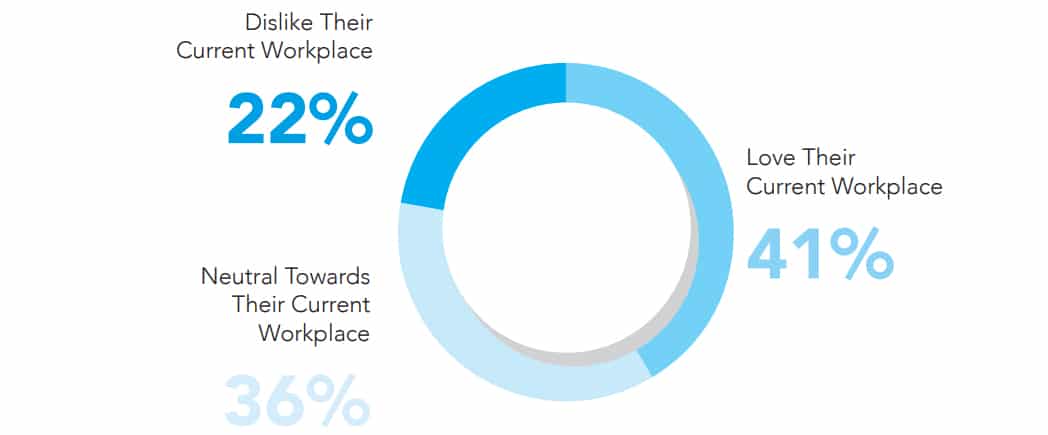 As we delve into the specifics of the data, we learn what generates the most loved response for employees, managers, and even the CEO. We learn what we can provide to create a most loved workplace culture for all employees, and what gains we can expect in return.
As we delve into the specifics of the data, we learn what generates the most loved response for employees, managers, and even the CEO. We learn what we can provide to create a most loved workplace culture for all employees, and what gains we can expect in return.
Learn what creates a most loved workplace and develop that culture in your own firm. Louis Carter’s Best Practice Institute survey shows what you can do to generate that response from your employees.
What Fosters a Most Loved Workplace?
Employees who responded to our survey were clear about what fosters a workplace they love. Across every demographic, the desire to be respected drives the most loved workplace response. In a most loved workplace 94% of employees report they would likely work harder for their employer, with 59% reporting they would be four times more likely to work harder and produce results.
How likely would it be, that you would perform better if you knew you were valued and respected by your co-workers.
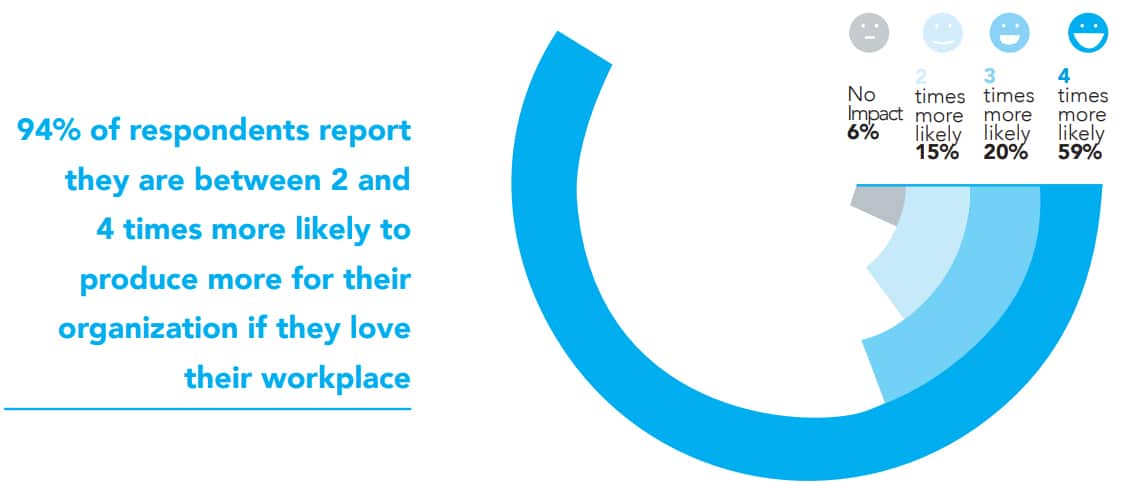
Another response points to retention, with 95% of employees citing the feelings they have for their team, peers, subordinates, and bosses as the most relevant factor in their decision to stay with a company.
How much more likely are you to stay with a company if you valued and respected the actions and behaviors of your co-workers.
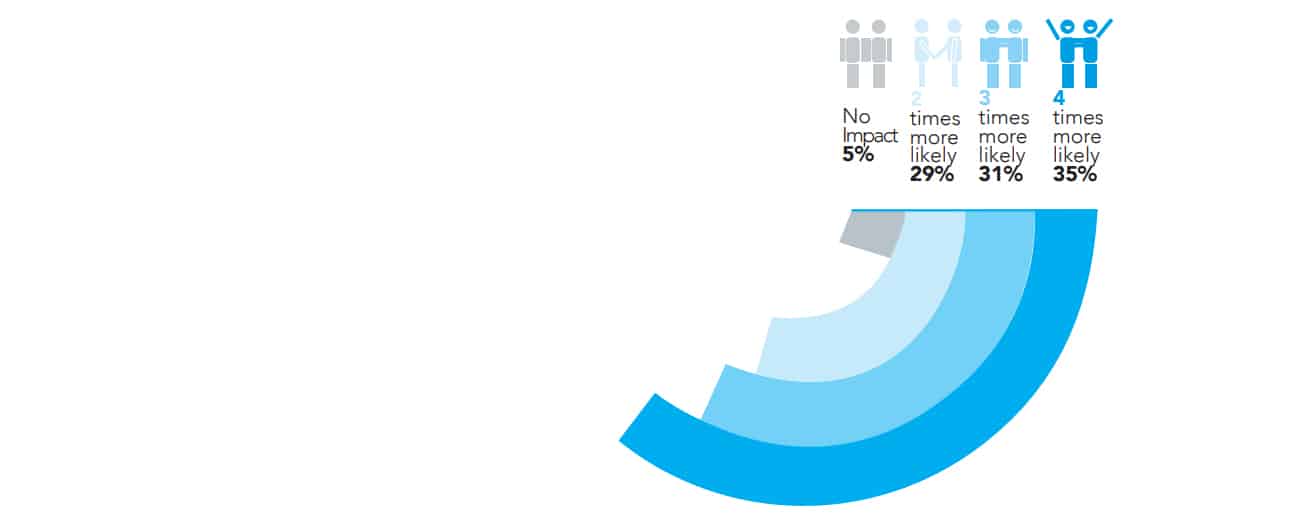
But what drives employees to “Love” their workplace, and what can we as Talent professionals do about it?
It’s not what you think. In fact, commonly discussed impacts like compensation, benefits and perks have very little impact on employees “loving” their workplace. So does having friends at work, which has been central to past studies. Our respondents were very clear what causes them to “Love” their workplace, and it’s about respect and a functional workplace environment.
A Feeling of Value and Respect From Others Is The #1 Reason Why People Love Their Workplace
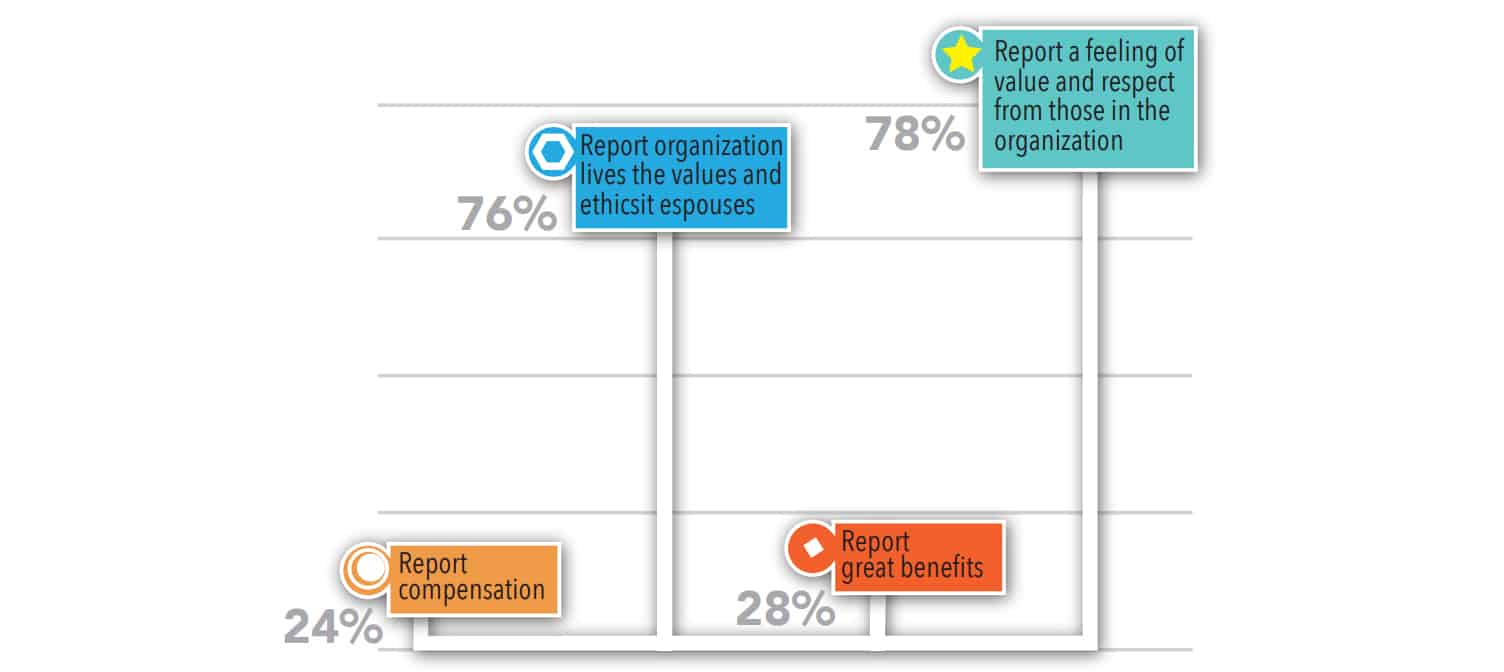
While receiving respect in the workplace is the key result of our survey, respect is something employees want to receive more significantly than to give. Responses show employees want to be respected more frequently than they want to give respect in return: for managers, the split between receiving and giving is even higher. For Human Resource professionals, the challenge is to provide an environment that shows employees they are respected, whether or not they respect others.
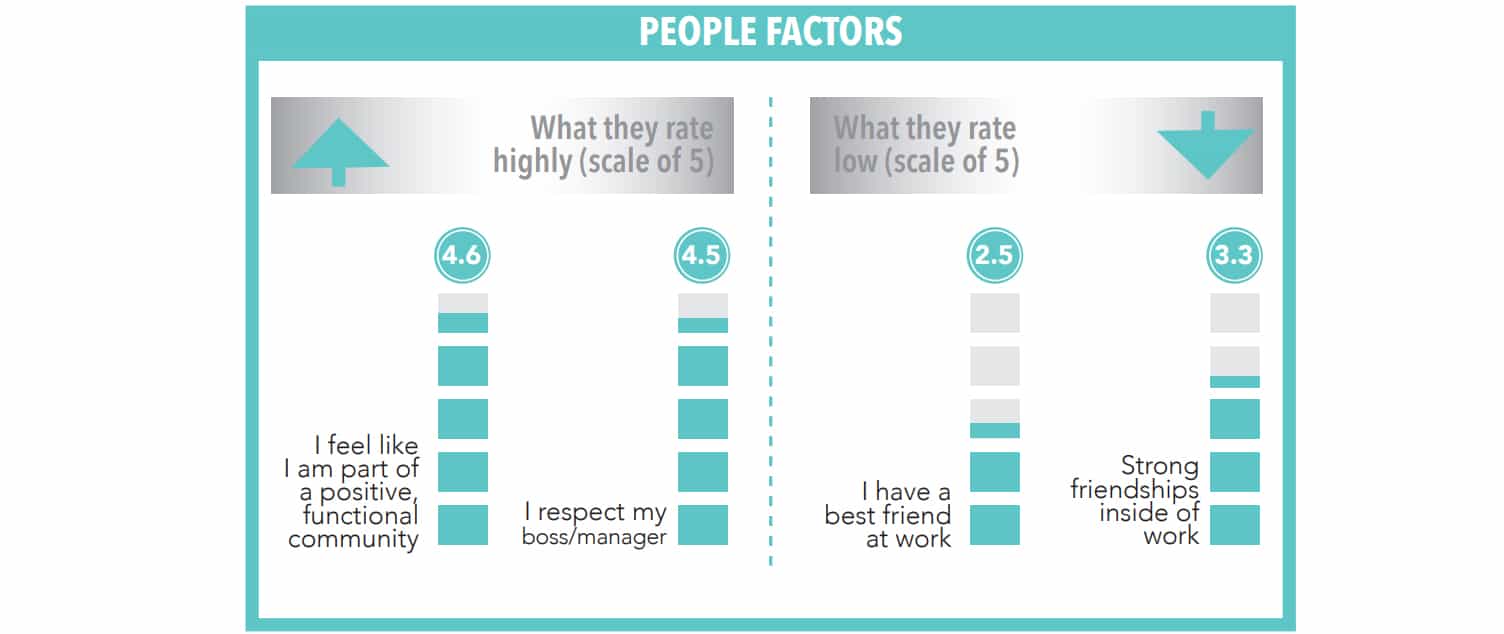
Respect sets the scene for the high performing most loved workplace. With this knowledge, we can create a Most Loved Workplace ® in every company.
Four Key Returns of the Most Loved Workplace Attitude
What does a most loved workplace reap in return for the sentiment?
Quite a lot: productivity.
1. People who work in a most loved environment are 94% more likely to perform better and provide results, with 59% saying they are four times more likely.
2. People factors create a most loved workplace. For
employees, being a part of a functional community was cited most often in the most loved workplace response. The result: a cohesive team.
3. Costly turnover is reduced. Feelings about the company, including bosses, subordinates and peers are significant when employees consider leaving their job.
4. 41% of employees would recommend their company to a friend or colleague. Top talent is an invaluable resource to find high performing staff. In addition, the team develops a larger sense of community.
Almost every aspect of the employee/employer experience benefits from a most loved workplace: and it only costs respect.
What Works and What Doesn’t
Of all the strategies we use to drive a sense of ownership, respect from the organization is most valued. For key cost centers in the employment cycle, we see a striking contrast in what we thought was working and what does not:
What Works:
• A most loved workplace generates a fourfold increased likelihood to perform better and produce results.
• Feelings for the boss, subordinates and peers gain a 40% higher likelihood to remain with a company.
• Respect from coworkers produces a fourfold increase in the likelihood to perform better.
• Employees who feel respected are twice as likely to recommend the company to friends and peers.
What Doesn’t:
• Compensation is cited only 1/3 as important as respect from the organization for managerial staff
• Flexible work schedules are cited 1/3 less important as respect from the organization for employees.
• Personal career development was cited almost 4 times less often than feelings about team members in respect to retention for employees. ©Copyright, Best Practice Institute 8
• Upward mobility was cited almost 8 times less often than other choices when deciding to stay with a company. Free office food, telecommuting, and all the newest, hottest extras were almost never chosen. Time and again, the survey points to respect as the single most important motivating factor for performance, retention, and more.
The Data
• How much more would you perform better for your organization in a most loved workplace? the results are clear and decisive: 94% of employees are likely perform better; with 59% four times more likely. Across all levels we could see high-performing employees that positively impact the bottom line Would you perform better for a Most Loved Workplace ®?
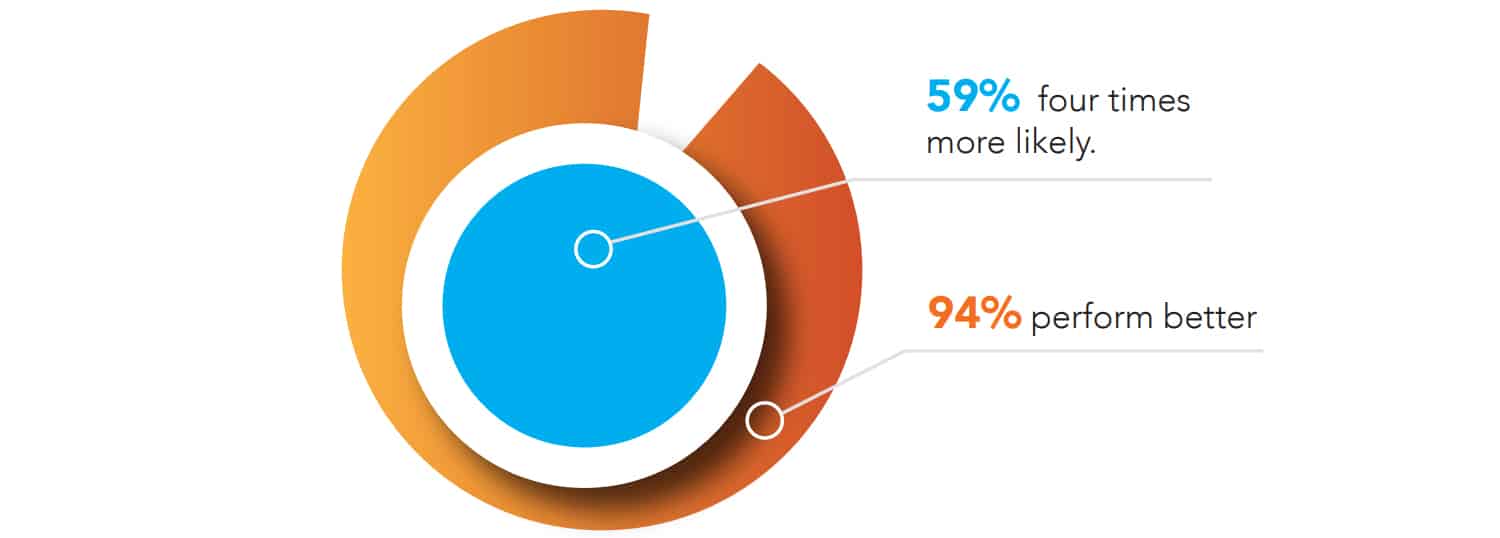
• Turnover is costly: 42% of employees say the feelings they hold for members of their team, peers, subordinates, and bosses, weigh heavily when deciding to stay with their firm.
What Heavily Weighs on a Worker’s decision to Stay with the company
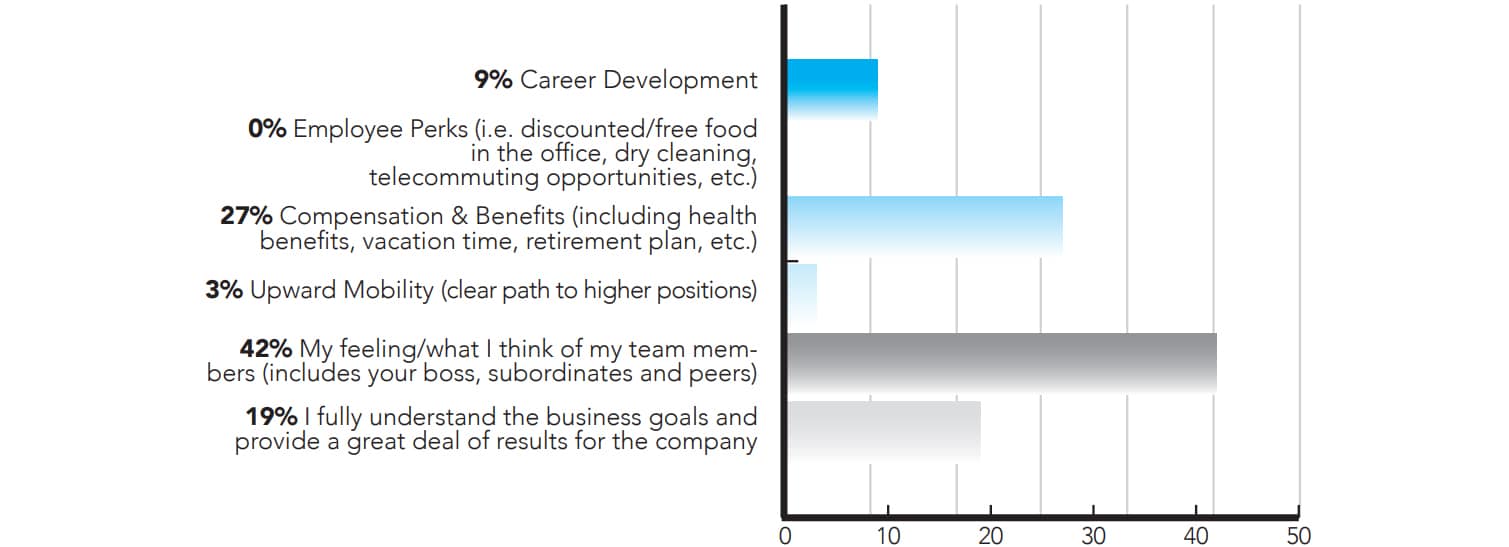
• Being respected by coworkers meant wanting to perform at a higher level and produce results in the majority of employees – over 59% at 4 times the level of performance.
When asked what actions and behaviors are valued and respected about coworkers, the top two responses were teamwork and respect. Three times more often than personal recognition; seven times more than receiving feedback.

The Split Between Those Who Love Their Company and Those Who Don’t
The cost of mediocre employees is staggering. At the most basic levels, employees who love their company are 14% more likely to perform better than those that don’t. This could show significant impact to any company’s bottom line. But there are more costs to consider.
Compensation and benefits are more important for those who dislike their company: 32% more important than for a Most Loved Workplace ® staffer. The Most Loved Workplace ® needs to rely less on overcompensating staff or providing extra benefits to spur performance and retention.
The difference between employees who love their company versus those who don’t affects productivity, retention, and recruitment. Employees in the most loved workplace produce results. Employees who don’t love their workplace burden companies with additional wages and benefits, bonuses, and extras that produce zero results.
A Most Loved Workplace®, one that reaps the highest return on investment, can’t be bought. Respect is what employees want, and we can give it for free.
Differences Globally and Between North America and Europe, the Middle East and Africa
While most of the survey data were consistent, in some areas we see divergence:
• In EMEA only 37% report they are four times more likely to perform better if they love their company versus 59% in North America.
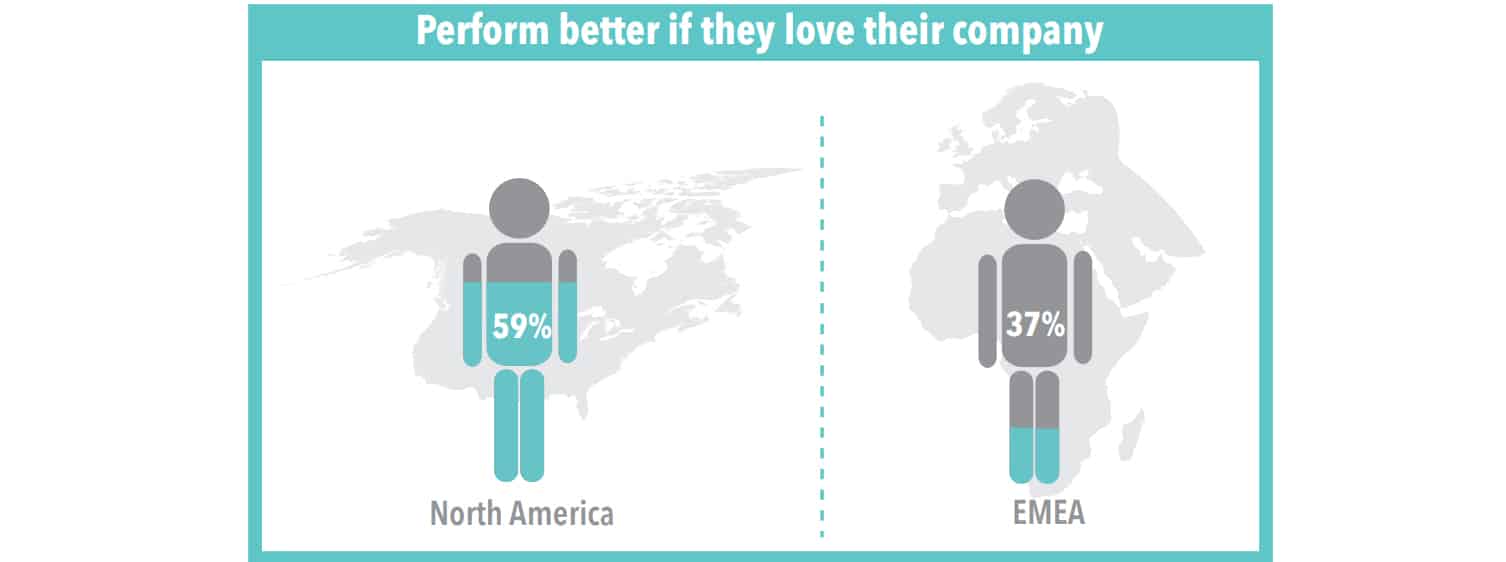
• While in North America benefits were chosen 44% less often than respect. In EMEA, benefits were chosen 100% less often than respect.
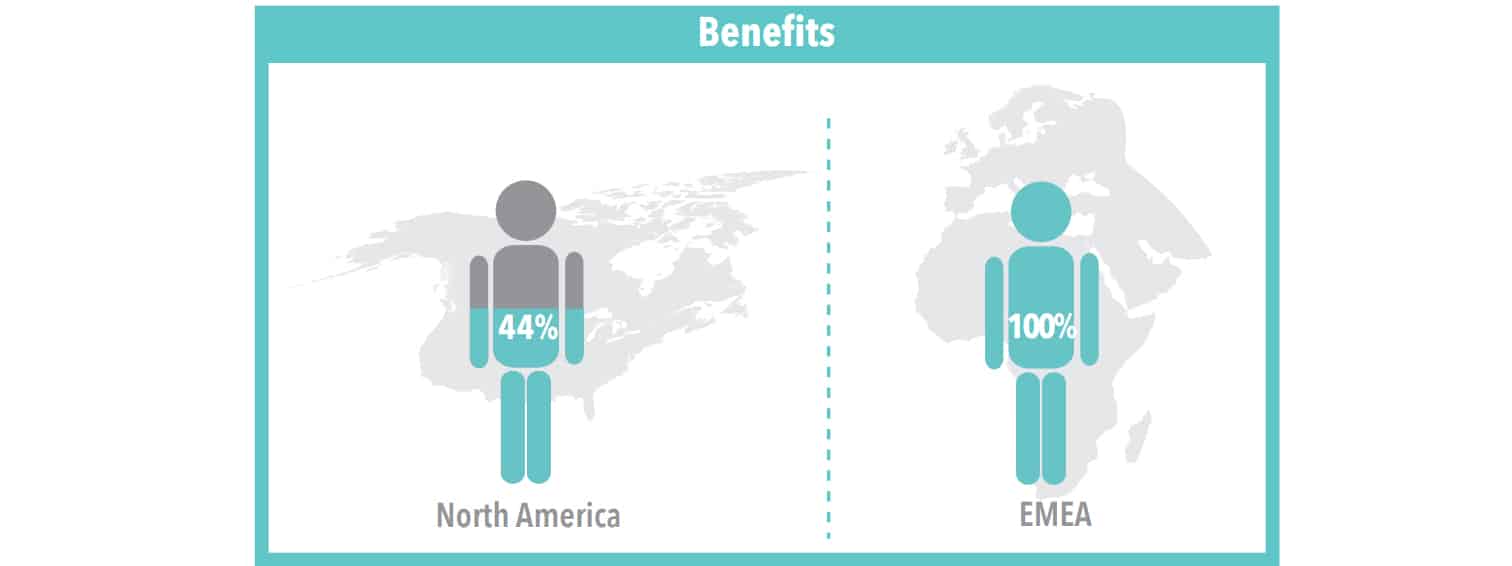
• For managers, with to respect, compensation was chosen 175%less often for the full sample, but only 67% less often in EMEA.
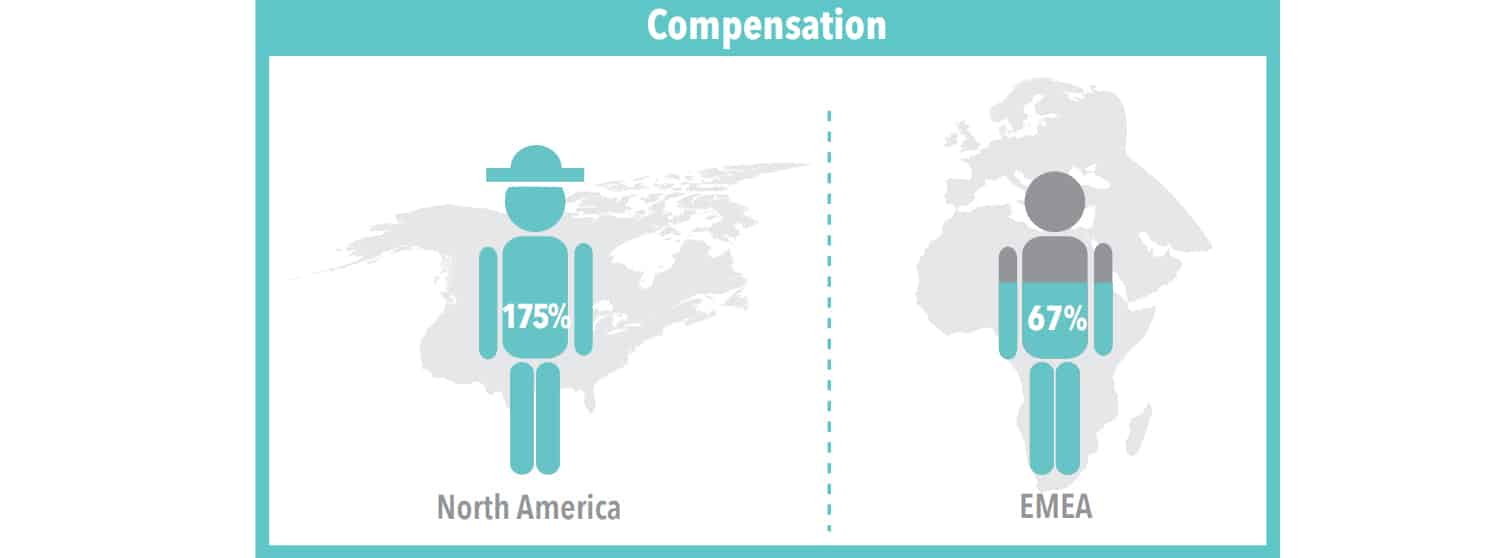
Closing Thoughts
Workplace Envy … and how to cause it Many companies look for external products, strategies, and benefits to create a most loved workplace. They know when employees take ownership, productivity rises. Our data reveals a most loved company can’t be bought. Costly extras don’t give employees the most basic, most desired commodity a company can offer its employees: respect.
A Most Loved Workplace ® drives productivity, from the break room to the bottom line. From the boardroom to the loading dock, when employees believe they are valued, the response is strong. They work harder to achieve personal and company goals, work more effectively within teams, and strive for success. All these are driven by respect.
The Most Loved Workplace ® is not elusive. When we promote an environment of respect a most loved workplace is the result. To cultivate a most loved workplace, and enjoy all the benefits it provides, start and end with respect.
ABOUT BPI and Most Loved Workplace
Founded by social/organizational psychologist, entrepreneur, and investor Louis Carter in 2001, Best Practice Institute is an award-winning leadership development center, think tank, product development incubator, solutions provider, peer network, research institute and online learning portal with more than 10,000 corporate and individual learning members around the world. Thousand’s of talent executives utilize BPI’s constantly evolving resources, developed under the direction of its Senior Executive Board made up of CHROs, CTOs, CLOs and Global Heads of Talent from some of the world’s most successful companies. He founded Most Loved Workplace in 2016 when starting his research for his new book, In Great Company. This research began a revolution in how we perceive loving our workplace and its effect on great workplace performance.
For more information about joining BPI’s Senior Executive Board or other services including Consultation and Executive Coaching, Best Practices Research, Thought Leadership Development, On-Site Transformation Meetings, and more, visit www.BestPracticeInstitute.org or email [email protected]. Get certified to become a Most Loved Workplace by visiting: Get Certified today.

Louis Carter is the founder and CEO of Best Practice Institute, Most Loved Workplace, and Results-Based Culture. Author of In Great Company, Change Champions Field Guide, and Best Practices in Talent Management, as well as a series of Leadership Development books. He is a trusted strategic advisor and coach to CEOs, CHROs, and leaders of mid-sized to F500 companies – enabling change and steering employer brand development together with highly effective teams, leaders, and organizations as a whole.

0 Comments